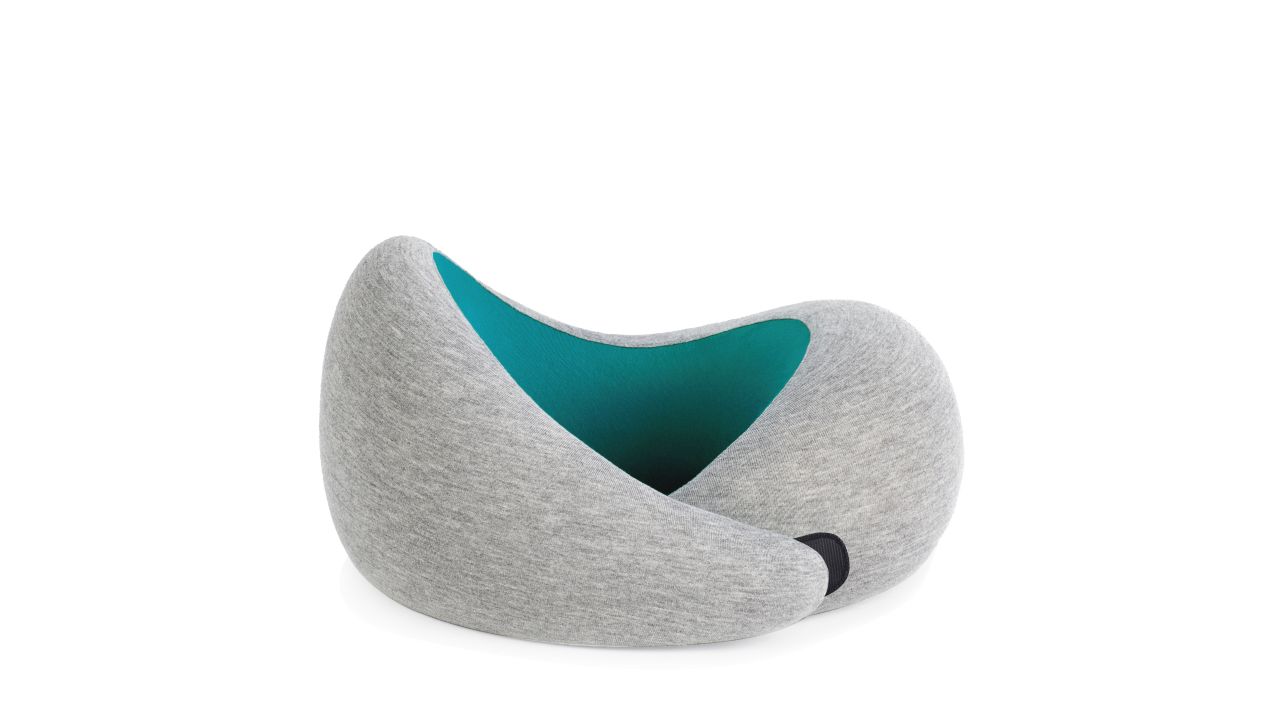

Articles
Why Do All Pillows Hurt My Neck
Modified: January 18, 2024
Discover why all pillows may be causing neck pain and find helpful articles to alleviate discomfort and improve sleep quality.
(Many of the links in this article redirect to a specific reviewed product. Your purchase of these products through affiliate links helps to generate commission for Storables.com, at no extra cost. Learn more)
Introduction
Neck pain is a common complaint that affects millions of people worldwide. It can be debilitating, making it difficult to perform daily activities and affecting overall quality of life. While there can be various causes of neck pain, one often overlooked factor is the pillow we sleep on.
Many individuals find themselves asking the question, “Why do all pillows hurt my neck?” This article aims to explore the relationship between neck pain and pillows, shedding light on the common causes and providing insights on choosing the right pillow to alleviate discomfort.
Understanding the underlying factors contributing to neck pain is crucial for finding effective solutions. By diving into the world of pillows and their impact on neck health, we can equip ourselves with the knowledge necessary to make informed choices and improve our overall well-being.
Throughout this article, we will explore the common causes of neck pain related to pillows, learn about the important factors to consider when selecting a pillow, and discover recommended pillow types and features for neck pain relief. Additionally, we will provide tips on how to use pillows effectively to alleviate neck pain and suggest additional strategies for managing neck pain.
However, it’s important to note that while pillows can provide relief for some individuals, they may not be a one-size-fits-all solution. If neck pain persists or worsens despite using the right pillow and implementing other measures, it is crucial to consult a healthcare professional for a proper diagnosis and treatment plan.
Now, let’s delve into the intricate relationship between pillows and neck pain, and empower ourselves with the knowledge needed to find comfort and relief.
Key Takeaways:
- The right pillow can alleviate neck pain by supporting proper spinal alignment and reducing pressure points, leading to improved sleep quality and overall neck health.
- While pillows play a crucial role in managing neck pain, it’s essential to seek professional help if pain persists or worsens, especially after a traumatic injury or when accompanied by concerning symptoms.
Read more: Why Does My Recliner Hurt My Back
Understanding Neck Pain
Neck pain can range from a mild discomfort to severe, debilitating pain. It can be caused by various factors, including muscle strain, poor posture, injury, degenerative conditions, and even stress. Regardless of the cause, neck pain can significantly impact our daily lives, affecting our ability to work, engage in physical activities, and enjoy quality sleep.
When it comes to understanding neck pain, it’s helpful to have a basic knowledge of the structure of the neck. The neck, or cervical spine, is composed of seven vertebrae that are responsible for supporting the weight of the head and allowing for a wide range of motion. Between these vertebrae are intervertebral discs that act as shock absorbers and facilitate smooth movement. The neck is also home to numerous muscles, ligaments, and nerves, all working together to support and stabilize the head.
When any part of this complex system is strained, irritated, or injured, it can result in neck pain. Common symptoms of neck pain include stiffness, limited range of motion, muscle tightness, headaches, and sometimes even radiating pain down the arms.
There are several factors that can contribute to the development of neck pain, such as:
- Poor posture: Spending long hours hunched over a desk or constantly looking down at screens can strain the muscles and ligaments in the neck, leading to pain and discomfort.
- Trauma or injury: Whiplash from a car accident, sports injuries, falls, or other sudden impacts can cause significant damage to the neck, resulting in acute or chronic pain.
- Degenerative conditions: Conditions like osteoarthritis, cervical spondylosis, and herniated discs can lead to the degeneration of the cervical spine, causing neck pain.
- Stress and tension: Emotional stress and tension can contribute to muscle tightness and trigger points in the neck, leading to pain and discomfort.
It’s important to remember that neck pain can have multiple underlying causes, and it may require a comprehensive evaluation by a healthcare professional to determine the exact source of the pain. Once the cause is identified, appropriate treatment can be provided to alleviate the symptoms and promote healing.
In the next section, we will explore the role of pillows in neck pain and how they can either exacerbate or alleviate discomfort. Understanding this relationship is essential for finding the right pillow and improving neck health.
The Role of Pillows in Neck Pain
When it comes to neck pain, many people overlook the potential impact of their pillows. However, the type of pillow you sleep on can play a significant role in either exacerbating or alleviating neck pain. Understanding how pillows affect your neck health is crucial for finding the right pillow that promotes proper spinal alignment and supports your neck while you sleep.
One of the primary functions of a pillow is to provide support for the head and neck, maintaining the natural curve of the cervical spine. When the neck is properly aligned, the weight of the head is distributed evenly, reducing strain on the muscles, ligaments, and discs in the neck.
However, using the wrong pillow or one that doesn’t provide adequate support can result in poor alignment and increased pressure on the neck, leading to discomfort and stiffness. Here are a few ways pillows can contribute to neck pain:
- Inadequate support: Using a pillow that is too flat, soft, or worn out offers little to no support to the neck. This can cause the neck to curve unnaturally, straining the muscles and supporting structures.
- Incorrect height: The height of the pillow is crucial for maintaining the natural curvature of the neck. If the pillow is too high or too low, it can disrupt the alignment of the cervical spine and lead to pain and discomfort.
- Poor pillow material: Pillows that lack proper cushioning or are made from low-quality materials may not provide adequate support, causing the head and neck to sink or sag into the pillow, resulting in misalignment.
- Allergy or sensitivity: Some individuals may be allergic or sensitive to certain pillow materials, such as feathers or synthetic fibers, leading to neck pain and other symptoms.
It’s important to note that the ideal pillow for neck pain can vary from person to person, depending on factors such as sleeping position, personal preferences, and any underlying neck conditions. What works for one individual may not work for another.
In the next section, we will explore the common causes of neck pain related to pillows, providing insights into why certain pillows can exacerbate discomfort. By understanding these causes, we can make informed choices when selecting a pillow for neck pain relief.
Common Pillow-related Causes of Neck Pain
When it comes to neck pain, pillows can often be the culprit. While pillows are meant to provide comfort and support, using the wrong type of pillow or not properly maintaining them can lead to neck pain and discomfort. Here are some common pillow-related causes of neck pain:
- Inadequate support: One of the main causes of neck pain from pillows is the lack of proper support. If your pillow is too flat or doesn’t provide enough cushioning, it can cause your head to sink down, misaligning your neck and placing strain on the muscles and joints. Similarly, an overly firm pillow can push your head up too high, causing an unnatural alignment in your neck.
- Incorrect height: The height of your pillow is crucial for maintaining proper alignment of your neck. If your pillow is too high or too low, it can lead to an awkward angle that strains the muscles and puts pressure on the joints. Side sleepers often require a higher loft pillow to properly support the head and neck, while back and stomach sleepers may need a lower loft pillow.
- Inappropriate sleeping positions: The way you sleep can also contribute to neck pain. Sleeping on your stomach, for example, can force your head to turn to one side, straining the muscles and causing discomfort. It is generally recommended to sleep on your back or side to promote better spinal alignment. However, even in these positions, an unsupportive pillow can still lead to neck pain.
- Old or worn-out pillows: Over time, pillows can lose their shape and support, becoming less effective at maintaining proper spinal alignment. If your pillow is lumpy, saggy, or doesn’t bounce back when you press on it, it’s time for a replacement. Using an old or worn-out pillow can contribute to poor neck support and exacerbate neck pain.
- Allergic reactions: Certain pillow materials, such as feathers or synthetic fibers, can trigger allergies or sensitivities in some individuals. Allergic reactions can cause nasal congestion, which can force you to breathe through your mouth while sleeping, leading to a strained neck and potential neck pain.
It’s important to remember that everyone is unique, and what works for one person may not work for another. The key is to find a pillow that provides proper support and alignment for your specific needs and preferences. In the next section, we will explore the essential factors to consider when choosing a pillow for neck pain relief.
The Importance of Proper Pillow Selection
Choosing the right pillow is essential for maintaining proper spinal alignment and alleviating neck pain. A pillow that provides adequate support and comfort can contribute to better sleep quality and overall neck health. Here are some key reasons why proper pillow selection is vital:
- Optimal spinal alignment: A pillow that supports the natural curvature of your neck helps maintain proper spinal alignment while you sleep. When your spine is aligned, it reduces strain on the muscles, ligaments, and discs in the neck, preventing discomfort and potential injuries.
- Pressure relief: A good pillow helps distribute the weight of your head and alleviate pressure points. This reduces the likelihood of waking up with a stiff neck or experiencing pain and discomfort throughout the day.
- Improved sleep quality: Proper neck support and alignment provided by the right pillow can lead to improved sleep quality. When your neck and spine are properly supported, you are more likely to achieve deep and restful sleep, waking up feeling refreshed and energized.
- Prevention of future neck issues: Investing in a high-quality pillow and paying attention to proper sleeping posture can help prevent future neck problems from developing. By selecting the right pillow, you can support your neck and promote healthy spinal alignment, reducing the risk of chronic neck pain and other related conditions.
- Personalized comfort: Everyone has unique preferences when it comes to pillow comfort. Some individuals prefer a soft and plush pillow, while others may require more firmness and support. Choosing a pillow that suits your personal comfort preferences can help you achieve a good night’s sleep and wake up free of neck pain.
While the importance of proper pillow selection cannot be overstated, it’s important to remember that there is no one-size-fits-all solution. What works for someone else may not work for you. It’s crucial to consider factors such as your sleeping position, any underlying neck conditions, and personal preferences when choosing a pillow.
In the next section, we will explore the factors you should consider when selecting a pillow to ensure you find the right one for your specific needs.
Read more: Why Do My Pillows Turn Yellow
Factors to Consider When Choosing a Pillow
Choosing the right pillow for neck pain relief requires careful consideration of several factors. By taking these factors into account, you can select a pillow that provides optimal support, comfort, and alignment for your neck. Here are the key factors to consider when choosing a pillow:
- Sleeping position: Your primary sleeping position plays a significant role in determining the type of pillow that will best support your neck. Side sleepers typically require a higher loft pillow to keep the head and neck aligned with the spine. Back sleepers need a medium loft pillow to maintain a neutral spine position, while stomach sleepers generally benefit from a low loft pillow to prevent excessive neck extension.
- Pillow material: Pillow materials can vary, each offering different levels of support and comfort. Common pillow materials include memory foam, latex, feathers, down, polyester, and cotton. Memory foam and latex pillows are known for their contouring abilities and pressure relief, while down and feather pillows provide a soft and airy feel. Consider your preferences for support, breathability, and allergies/sensitivities when choosing the material.
- Pillow size and loft: The size and loft (height) of the pillow are vital considerations. The pillow should adequately support your head and neck without causing strain or misalignment. A pillow that is too high or too low can lead to discomfort and pain. Take into account factors such as your body size, shoulder width, and the firmness of your mattress when selecting the proper pillow size and loft.
- Firmness: The firmness level of the pillow is a matter of personal preference. Some individuals prefer a soft and plush pillow, while others find more support and comfort in a firmer option. Test out different firmness levels to find the one that feels most comfortable for you while still providing adequate support for your neck.
- Special considerations: Depending on your specific needs, you may need to consider additional factors. For example, if you have allergies or sensitivities, opt for hypoallergenic materials. If you experience excessive sweating, look for a pillow with cooling properties. Neck conditions such as cervical spondylosis or herniated discs may require specific types of pillows recommended by healthcare professionals.
Remember, finding the right pillow may take some trial and error. It is advisable to test out different pillows or consult with a healthcare professional for personalized recommendations. Many manufacturers offer trial periods or return policies, allowing you to try the pillow before committing to it.
In the next section, we will discuss recommended pillow types and features that can help relieve neck pain and promote better sleep quality.
Try using a pillow that provides proper support for your neck, such as a memory foam or contoured pillow. Also, make sure to maintain good sleeping posture to reduce strain on your neck.
Recommended Pillow Types and Features for Neck Pain Relief
When it comes to finding a pillow that can provide relief from neck pain, there are several types and features that are often recommended. While the ideal pillow can vary depending on individual preferences and specific neck conditions, here are some popular options to consider:
- Orthopedic pillows: Orthopedic pillows are specially designed to support the neck and promote proper spinal alignment. These pillows often have contours and shapes that cradle the head and neck, relieving pressure and reducing strain on the muscles and joints. Memory foam or latex orthopedic pillows are popular choices due to their ability to conform to the shape of the neck while providing support.
- Cervical pillows: Cervical pillows have a unique shape that is designed to support the natural curvature of the cervical spine. These pillows have a depression in the center and raised edges that provide support for the neck. Cervical pillows are available in different materials and levels of firmness, allowing you to find the one that suits your needs.
- Adjustable pillows: Adjustable pillows allow you to customize the loft and firmness to your desired level of support. These pillows often have removable inserts or layers that can be added or removed to achieve the desired height and firmness. Adjustable pillows are great for individuals who need versatility and want the ability to fine-tune their pillow to their specific needs.
- Memory foam pillows: Memory foam pillows are known for their ability to contour to the shape of the head and neck, providing personalized support. They offer excellent pressure relief and can help alleviate neck pain by reducing pressure on sensitive areas. Look for memory foam pillows with a medium to high density for optimal support and durability.
- Cooling pillows: If you tend to get hot while sleeping, consider a cooling pillow. These pillows are often made with breathable materials, gel-infused foams, or built-in cooling technologies to regulate temperature and prevent overheating. By keeping your head and neck cool throughout the night, cooling pillows can contribute to better sleep quality and reduce discomfort.
Aside from the pillow type, there are additional features to consider for neck pain relief. These include:
- Removable and washable covers: Look for pillows with removable and washable covers to keep your pillow clean and free from allergens and dust mites.
- Contoured designs: Pillows with contoured designs can provide better support and help maintain proper spinal alignment.
- Hypoallergenic materials: If you have allergies or sensitivities, opt for pillows made from hypoallergenic materials to minimize potential allergic reactions.
- Supportive fill materials: Different fill materials, such as memory foam, latex, or polyester fibers, offer different levels of support and comfort. Consider your personal preferences and any specific neck conditions when choosing the fill materials.
Remember, the right pillow for neck pain relief is subjective and may require some experimentation to find the best fit for you. Take into account your individual needs, preferences, and any recommendations from healthcare professionals to make an informed decision.
In the next section, we will provide some tips for using pillows effectively to alleviate neck pain and promote proper sleep posture.
Tips for Using Pillows to Alleviate Neck Pain
Using pillows effectively can play a crucial role in alleviating neck pain and promoting proper sleep posture. Here are some tips to help you get the most out of your pillows for neck pain relief:
- Select the right pillow: Choose a pillow that suits your sleeping position, provides proper support, and maintains proper alignment of your neck and spine. Consider factors such as loft, firmness, and material to find the pillow that works best for you.
- Keep your spine aligned: Ensure that your head, neck, and spine are in a neutral position while you sleep. This means your pillow should neither be too high nor too low. The goal is to maintain a straight line from the base of your skull to your tailbone.
- Use additional support if needed: If you find that one pillow is not enough to achieve proper alignment, consider using additional pillows or cushions to provide extra support. For example, placing a thin pillow or a rolled-up towel under your neck can help maintain the natural curve of your spine.
- Replace old pillows: Over time, pillows lose their support and shape. Replace your pillow regularly, ideally every 1-2 years, to ensure it continues to provide adequate support for your neck.
- Experiment with pillow position: Finding the right position for your pillow is important. Experiment with different pillow heights and positions to determine what feels most comfortable and provides the best support for your neck.
- Practice good sleep posture: In addition to using a supportive pillow, practice good sleep posture. Avoid sleeping on your stomach as it can strain your neck. Instead, try to sleep on your back or side, using pillows to support the natural alignment of your spine.
- Use a pillow for lumbar support if needed: If you experience lower back pain along with neck pain, consider using a lumbar support pillow or a rolled-up towel to support the natural curve of your lower back while you sleep.
- Pay attention to pillow hygiene: Regularly clean your pillows according to the manufacturer’s instructions to keep them free from allergens, dust mites, and bacteria. Use hypoallergenic pillow covers to minimize allergen exposure.
It’s important to remember that individual preferences and needs may vary, and what works for one person may not work for another. It may take some trial and error to find the perfect combination of pillow type, loft, and positioning that provides optimal neck pain relief for you.
Lastly, while pillows can offer relief for neck pain, they are not a substitute for proper medical care. If your neck pain persists or worsens, it is important to consult with a healthcare professional for a comprehensive evaluation and appropriate treatment.
In the next section, we will explore additional strategies for managing neck pain beyond pillow use.
Additional Strategies for Neck Pain Management
While using the right pillow is essential for managing neck pain, there are additional strategies you can incorporate into your routine to further alleviate discomfort and improve neck health. Here are some additional strategies for managing neck pain:
- Good posture: Maintaining good posture throughout the day can help reduce strain on the neck. Practice proper ergonomics when sitting, standing, and engaging in activities to keep your spine aligned and your neck in a neutral position.
- Regular stretching and exercise: Engaging in regular stretching and strengthening exercises can help improve neck flexibility and strengthen the muscles in the neck and upper back. Consult with a healthcare professional or a qualified physical therapist for appropriate exercises tailored to your specific needs.
- Heat and cold therapy: Applying a heat pack or taking a warm shower can help relax tense muscles and alleviate neck pain. Cold therapy, such as using an ice pack or a cold compress, can help reduce inflammation and swelling in acute cases of neck pain.
- Massage therapy: Massage therapy can help relieve muscle tension and reduce discomfort in the neck. Consider getting regular massages from a licensed massage therapist or try self-massage techniques using your hands or a massage tool.
- Stress management: Stress and tension can contribute to neck pain. Engage in stress management techniques such as deep breathing exercises, meditation, yoga, or engaging in activities that help you relax and unwind.
- Ergonomic adjustments: Make necessary ergonomic adjustments to your workspace or daily activities to reduce strain on your neck. Use supportive chairs, adjust the height of your computer monitor, and take regular breaks to move and stretch.
- Sleep hygiene: In addition to using a supportive pillow, practicing good sleep hygiene can contribute to better sleep quality and reduced neck pain. Establish a consistent sleep schedule, create a comfortable sleep environment, and engage in relaxing bedtime rituals.
- Seek professional help if needed: If your neck pain persists or worsens, it is important to consult with a healthcare professional. They can provide a proper diagnosis, recommend specific treatments, and guide you through therapeutic exercises or other interventions.
Remember, everyone’s neck pain is unique, and not all strategies may work for everyone. It’s important to listen to your body, take breaks when needed, and find a combination of strategies that work best for you.
Neck pain can impact your daily life and overall well-being, but with proper pillow selection, lifestyle adjustments, and additional strategies, you can manage and alleviate discomfort to restore better neck health and improve your quality of life.
In the final section, we will discuss when it is necessary to consult a healthcare professional for neck pain.
Read more: Why Does My Bed Hurt My Back
When to Consult a Healthcare Professional
While many cases of neck pain can be managed with self-care measures and lifestyle adjustments, there are instances when it is necessary to consult a healthcare professional for proper evaluation and treatment. Here are some signs that indicate it is time to seek medical attention for your neck pain:
- Severe or worsening pain: If your neck pain is severe, unbearable, or getting worse over time, it is important to consult a healthcare professional. They can assess the underlying cause of your pain and recommend appropriate treatment options.
- Neck pain after a traumatic injury: If your neck pain is a result of a traumatic injury, such as a fall, car accident, or sports injury, it is crucial to seek immediate medical attention. These types of injuries may involve damage to the spine, nerves, or soft tissues, requiring prompt evaluation and intervention.
- Neck pain accompanied by other concerning symptoms: If your neck pain is accompanied by other symptoms such as numbness, weakness, tingling, difficulty swallowing or breathing, or radiating pain down the arms, it may indicate a more serious underlying condition. These symptoms warrant a thorough medical evaluation to identify the cause and appropriate management.
- Persistent or recurring neck pain: If your neck pain persists for more than a few weeks or frequently recurs, it is advisable to consult a healthcare professional for a proper evaluation. They can determine the underlying cause of your pain and recommend targeted treatment options to address the issue.
- Neck pain following surgery or medical procedure: If you have recently undergone neck surgery or any medical procedure near the neck area and you are experiencing new or worsening pain, it is essential to reach out to your healthcare provider. They can assess whether the pain is a normal part of the healing process or if further intervention is necessary.
- Unexplained weight loss or fever: If your neck pain is accompanied by unexplained weight loss or fever, it may be a sign of an underlying infection or systemic condition. In these cases, it is important to consult a healthcare professional for an accurate diagnosis and appropriate treatment.
It’s crucial to trust your instincts and seek medical attention if your neck pain is causing significant discomfort or if you have any concerns about your symptoms. A healthcare professional, such as a primary care physician, orthopedic specialist, or physical therapist, can provide a comprehensive evaluation, develop an appropriate treatment plan, and offer guidance on managing your neck pain.
By seeking prompt medical attention when necessary, you can receive the proper care and support needed to address the underlying cause of your neck pain and work towards achieving long-term relief and improved neck health.
Bringing this article to a close, we’ve explored the relationship between pillows and neck pain, discussed common pillow-related causes of neck pain, and provided insights and tips on proper pillow selection, usage, and additional strategies for managing neck pain. Remember, finding the right pillow and implementing lifestyle adjustments can go a long way in alleviating discomfort, but if your neck pain persists or worsens, do not hesitate to seek professional help.
Take care of your neck, prioritize your sleep and well-being, and embrace a pain-free life!
Conclusion
Neck pain can be a debilitating condition that affects our daily lives and overall well-being. While there can be various causes of neck pain, pillows often play a significant role in exacerbating or alleviating discomfort. Selecting the right pillow and using it effectively can make a world of difference in managing neck pain and promoting better sleep posture.
Throughout this article, we have explored the relationship between pillows and neck pain, delving into the common causes of pillow-related neck pain and providing valuable insights on proper pillow selection. We have discussed the importance of maintaining proper spinal alignment and optimal neck support while sleeping, as well as factors to consider when choosing a pillow, such as sleeping position, pillow material, size, and firmness.
Additionally, we have explored recommended pillow types and features specifically designed for neck pain relief. From orthopedic pillows to memory foam options and adjustable pillows, there are various choices to suit individual preferences and needs. By incorporating these pillows into our sleep routine, adopting good sleep posture, and implementing additional strategies like stretching, exercise, and stress management, we can further alleviate neck pain and improve our overall neck health.
However, it is important to recognize that proper pillow selection and self-care measures may not be sufficient for everyone. If your neck pain persists, worsens, or is accompanied by other concerning symptoms, it is crucial to consult a healthcare professional for a thorough evaluation and personalized treatment plan.
Remember, everyone’s journey with neck pain is unique, and finding the right combination of strategies for relief may take some trial and error. Trust your instincts, listen to your body, and seek the guidance of healthcare professionals when needed.
Here’s to a future free from neck pain and a peaceful night’s sleep filled with comfort and serenity!
Frequently Asked Questions about Why Do All Pillows Hurt My Neck
Was this page helpful?
At Storables.com, we guarantee accurate and reliable information. Our content, validated by Expert Board Contributors, is crafted following stringent Editorial Policies. We're committed to providing you with well-researched, expert-backed insights for all your informational needs.














0 thoughts on “Why Do All Pillows Hurt My Neck”